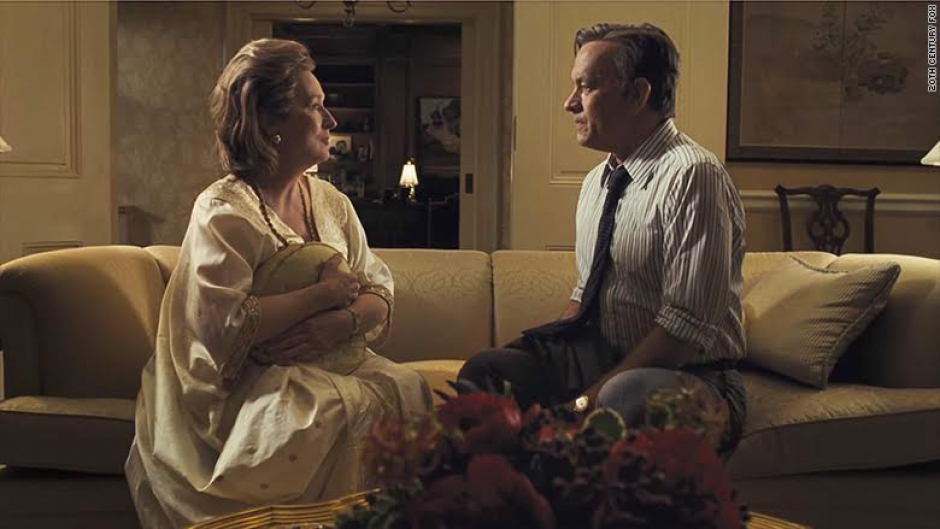With the current political pressures being exerted on news media in the US, cinematic comfort-blanket Steven Spielberg seems super-delighted to have emerged with such a timely film. In interviews, he’s pitched The Post as a rallying cry for the embattled news media of today; the posters shouting STREEP and HANKS like they are totemic warriors of justice, with broad shoulders, rolled-up sleeves and a can-do attitude. The film itself, however, is a little too soft around the edges, a little too infused with the sentimental Spielberg of War Horse, rather than the gutsier Spielberg of the underrated Munich. Tension is built up for The Post but there is never any doubt as to the outcome, nor do we get all that much further than the slightly dull basics; this is just a film about people looking at bits of paper in order to make another bit of paper.
It seems a tad embarrassed by this at times. Characters are continually pacing and moving for no good reason, and sometimes the camera drifts and wanders where it might have been better just to sit still and watch. There is a sense that action is being injected, just for the sake of having some movement and in later scenes, the clunking, rolling printing press is intercut in an effort to bulk out this rather artificial sense of momentum. The result is a triumph that falls a little flat – that feels inevitable and lovely rather than shocking and revolutionary.
The Post documents the battle between the Nixon administration and The Washington Post over the publication of the leaked Pentagon Papers in 1971 which revealed the extent of deception from various presidents over the conduct of the Vietnam War. Hanks plays editor-in-chief Ben Bradlee with a firm but lovable authority, while Streep takes the role of Kay Graham, the paper’s owner, a lone female in a masculine world, upon whose shoulders the decision to publish or not publish rests. Both Streep and Hanks are as excellent as ever, especially when together – there was something particularly refreshing about the depiction of a male and female friendship based on mutual admiration and respect, with no sexual overtones. I could have watched a whole film of them just having a conversation over breakfast.
Streep’s Kay Graham is a curious figure; reserved and fidgety, struggling with her nerves in front of the paper’s investors, but then entirely affable and forthright when she needs to be. Streep handles these complexities well, knowing when to hesitate, when to raise her voice, and there is never any sense that the character will let us down and crumble at the last moment. Spielberg is a little heavy-handed, however, on the ‘woman-in-a-man’s-world’ motif, continually thrusting Kay into crowds of men, or making a show of packing her and the other women off to the side room while the men stay at the dinner table and talk business. There must be less cliched ways of making this point now, but Spielberg doesn’t seem to have quite found those subtleties just yet. Nevertheless, Kay Graham is another strong female role model to add to the ever-growing roster, and the idea that Hollywood is now slipping into clichés in the process of these representations is surely a good sign.
Once the story picks up a little pace, after the efforts of journalist Ben Bagdikian (the eternally entertaining Bob Odenkirk), it is easy to be swept into the back and forth of The Post, and the little tics of Spielbergian humour and energy keep entertainment levels at a comfortable medium. There are a couple of chilling moments when the real-life recordings of Nixon drop in, demanding the defeat of the Washington Post while we peer worriedly through the White House windows watching the rattled president hunched in his paranoia. For those moments, the world of the film suddenly whips away leaving us with a cold reality while we contemplate what the current incumbent might be saying into that very phone at this very time. They are indulgences on the part of Spielberg, but affective ones.
Ultimately, The Post celebrates the integrity and freedom of the American Press as one of the founding principles of the constitution, at a moment when the press itself may well need that pep talk, and some citizens may well need the reminder. And yet, after walking out safe in the knowledge that the White House monster of the early seventies soon got his comeuppance, the White House monster of present day seems ever more fixed in place, despite (or perhaps largely because of) everything the media could throw at him. So, while The Post is timely, and welcome, the final fade to credits feels a touch hollow because it points to a victory that now seems to need wildly different parameters. Perhaps its fairer to say that The Post does not quite provide us with the tools for revolution, but it certainly shores up the spirit.
by David Hartley

